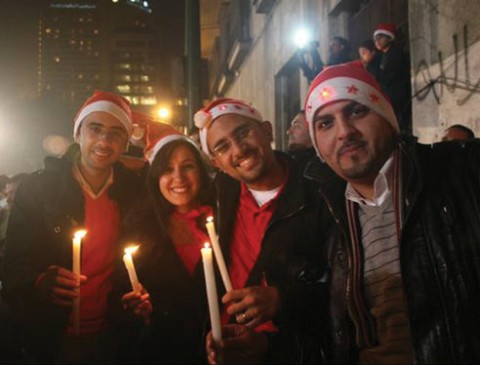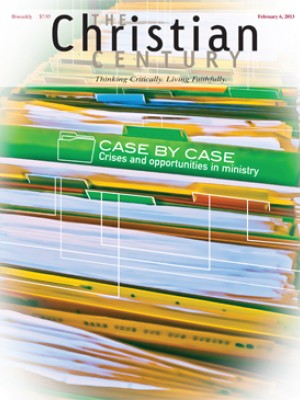Uneasy in Cairo: Egypt’s new constitution

Concerts that were scheduled for New Year’s Eve to mark the 2011 Egyptian revolution were canceled in Cairo after a protester was shot that day in Tahrir Square. Instead of attending those events, many people of different denominations and faiths flocked to nearby Kasr El Dobara Church, the largest Protestant church in the Middle East, for a prayer service.
“Our land is sick, our thoughts are sick. God, heal us and help us welcome the New Year without fear,” prayed Sameh Maurice, the head pastor. “If we do not change from the inside, our circumstances will not change.”
Mina Malak, a Christian, said, “We came here to pray and to take a promise from God—that he will heal us and our country in the coming year.”
Anan Abdel-Hadi, a Muslim, insisted that the alliance between Christians and Muslims that was evident during the overthrow of Hosni Mubarak remains strong. “It is natural in Egypt for Muslims and Christians to celebrate their holidays together. We have been in Tahrir since the beginning, so we celebrate in this church, which has opened its doors to the revolution. It is impossible for us [Muslims and Christians] to be divided. The crises of our country have only brought us closer together.”
Read our latest issue or browse back issues.
But Egypt is divided in many ways. The postrevolutionary election produced a parliament dominated by the Muslim Brotherhood and ultraconservative Salafi Muslims. Those forces had the upper hand in selecting the 100-member committee tasked with writing a new constitution. Some liberal members withdrew immediately to protest the Islamist composition of the committee. Others, including representatives of Orthodox, Protestant and Catholic churches, tried to work toward a consensus document, but many eventually resigned as well.
Christians and moderate Muslims are concerned about Article 2 in the new constitution, which establishes the principles of Shari‘a as the primary source of legislation. However, since courts have generally interpreted “principles” to mean the ideal of justice in Islam, not more detailed rulings, this clause was not as much of a problem as Article 4, which gives the unelected scholars in al-Azhar, the Cairo-based center of learning for the Sunni Muslim world, a role in consulting on all laws touching Shari‘a.
Meanwhile, Article 219 of the new constitution changes the interpretation of “principles” in a significant way: “The principles of Islamic Shari‘a include general evidence, foundational rules, rules of jurisprudence, and credible sources accepted in Sunni doctrines and by the larger community.” It appears from this clause that legislation must conform specifically to the corpus of Islamic law. While the constitution guarantees many rights and freedoms, all are made subject to the Islamic identity of the state through Article 81. Furthermore, Article 76 opens a door to applying Islamic punishments even outside the written law.
Yassir al-Burhami, leader of the Salafi Call, celebrated the new rules. “This constitution has restrictions [on rights and freedoms] that have never been included in any Egyptian constitution before,” he said in endorsing the constitution.
President Mohamed Morsi broke his promise to present a constitutional draft adopted by consensus. In a move that recalled the authoritarian actions of Mubarak, Morsi seized dictatorial powers to avert a judicial ruling which had threatened to dissolve the committee writing the constitution.
The hardline Islamic rhetoric in support of the constitution made Christians uneasy. Many Christians joined demonstrations against Morsi and the constitution. Safwat Hegazi, appointed by Morsi to serve on the National Council for Human Rights, declared that if the church challenged presidential legitimacy over the constitution, the church would be challenged “with blood.”
In this volatile atmosphere, church leaders trod carefully. They simply encouraged their flocks to participate in the referendum on the constitution and to vote according to conscience. Judging from overwhelming anecdotal evidence, most voted no.
“As long as the church was not able to give its voice to the constitution, we are against it,” said Amal Sami, a housewife, who attended a prayer meeting of 10,000 Christians before the December referendum.
Voters eventually approved the constitution with 64 percent of the vote (though there was only a 33 percent turnout). Egypt has been mostly quiet since. President Morsi has softened his rhetoric and invited the political opposition to “dialogue” about the way forward.
The political revolution did not unfold the way Christians had hoped. In response, they are back in church, asking God to preserve their community and their country. But there is one thing that has changed. Before the revolution, it was largely the church hierarchy that represented Christians in the political sphere. Since then, the hierarchy has stepped back from politics, but ordinary Christians have stepped forward, turning out to vote and to join in political demonstrations to make their voices heard.





